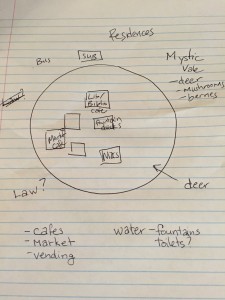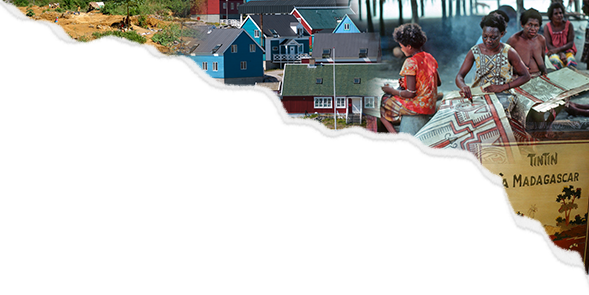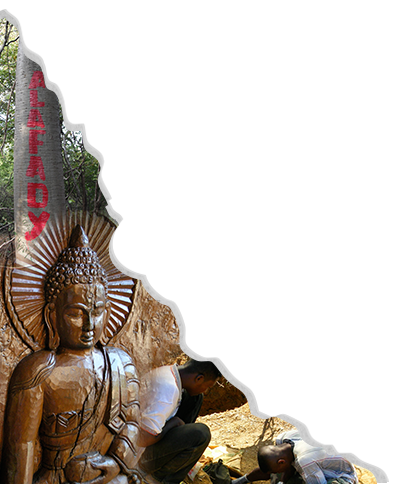 Our love affair with zombies has lasted at least a decade, if not more (28 Days Later came out in 2002!). And yet it doesn’t seem to grow old. Season 7 of The Walking Dead begins later this month, and Fear the Walking Dead appears to be set for a third season. Resident Evil: The Final Chapter and World War Z 2 will be coming out in 2017. People have turned to zombies to inspire things like emergency preparedness (see the Centers for Disease Control and Prevention website for Zombie Preparedness and a range of zombie products, for instance). It should be no surprise that zombies have entered the classroom too.
Our love affair with zombies has lasted at least a decade, if not more (28 Days Later came out in 2002!). And yet it doesn’t seem to grow old. Season 7 of The Walking Dead begins later this month, and Fear the Walking Dead appears to be set for a third season. Resident Evil: The Final Chapter and World War Z 2 will be coming out in 2017. People have turned to zombies to inspire things like emergency preparedness (see the Centers for Disease Control and Prevention website for Zombie Preparedness and a range of zombie products, for instance). It should be no surprise that zombies have entered the classroom too.
Back in 2013, Professor Jeffrey Cohen, of Ohio State University, shared his Anthropology of the Undead syllabus with the Teaching Culture Blog, but my favourite example of zombies in school is ZBL: Zombie-Based Learning in geography. This was something created by American middle school teacher David Hunter for his students, but went viral (so to speak) by way of KickStarter. I only found this example recently, but it’s already got me thinking about possibilities for down the road.
Zombies entered my own Introduction to Anthropology classes through one of my TAs. When TAs are keen, I provide them with the opportunity for guest lectures. Some do a mini-talk based on their research. Every now and then, one asks to take on a full-course lecture. It’s a portfolio building opportunity for them, a fresh perspective for my students, and it gives me a chance to get some new ideas. Last year, one of my TAs proposed a guest lecture on hunter-gatherers. She came to me with her slides a few days before the lecture and I laughed to see the addition of a screen shot from The Walking Dead as an example of a hunter-gatherer society. But, she pointed out that more students would be familiar with The Walking Dead than they would with her other examples (the traditional !Kung and Inuit examples seen in so many textbooks). I agreed to the example, but pointed out that the lecture was too static. There was too much lecture and not enough activity/thinking. Together, we designed a short zombie apocalypse activity.
After reviewing examples of hunter-gatherer societies (including The Walking Dead reference), students are told to imagine that it’s the zombie apocalypse and they have found themselves on campus. The unit on hunter-gatherers introduces students to concepts like Traditional Ecological Knowledge (TEK), foodways, and reciprocity. Not all of these are relevant in the zombie apocalypse, but we can explore foodways, for instance, by looking at how the apocalypse changes traditional foodways (the lack of grocery store shopping and a shift to foraging). To a certain extent, it is possible to point out the impact of a lack of TEK. For instance, in Season 4 (Episode 5), two of the main characters from The Walking Dead are foraging for tomatoes, but only take fully ripened tomatoes. This is likely because the consumption of green tomatoes is culturally foreign to them, and they don’t realize they have missed an opportunity. Indeed, a lot of the foraging in The Walking Dead is of ready-made food, gathered from places where people used to live. This provides a great contrast with traditional foraging societies, where raw food resources are gathered to be cooked or processed.
 The exercise involves students working in groups to draw a map of campus (see example included here), locating possible food and water sources, shelter, etc. These are collected at the end of class, earning students a virtual badge. Student answers vary from team to team. Some focus exclusively on cafeterias and vending machines, very much in keeping with the TV series. Others get caught up in the idea of hunting deer and gathering berries from the rather abundant supply on campus, trying to think like hunter-gatherers. But campus secrets start to emerge too. Some students are familiar with the community gardens and the Biology Department’s greenhouses, for instance. It becomes an opportunity for students to share what they know about their campus with each other, which is actually very useful in a first-year environment. And, as I’m part of the campus emergency team, I mention the presence of emergency water rations, office earthquake kits, and the like. This means that I can take a moment to nudge them gently about their own emergency preparedness in the guise of talking about anthropology.
The exercise involves students working in groups to draw a map of campus (see example included here), locating possible food and water sources, shelter, etc. These are collected at the end of class, earning students a virtual badge. Student answers vary from team to team. Some focus exclusively on cafeterias and vending machines, very much in keeping with the TV series. Others get caught up in the idea of hunting deer and gathering berries from the rather abundant supply on campus, trying to think like hunter-gatherers. But campus secrets start to emerge too. Some students are familiar with the community gardens and the Biology Department’s greenhouses, for instance. It becomes an opportunity for students to share what they know about their campus with each other, which is actually very useful in a first-year environment. And, as I’m part of the campus emergency team, I mention the presence of emergency water rations, office earthquake kits, and the like. This means that I can take a moment to nudge them gently about their own emergency preparedness in the guise of talking about anthropology.
How much do they actually learn about hunter-gatherers through this activity? Probably not as much as I’d like. But, in the end, I hope it’s a memorable experience, an opportunity to get to know their neighbours, and a chance to become more familiar with their surroundings. Those aren’t bad goals either.



